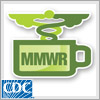A CUP OF HEALTH WITH CDC
Autism Awareness
Prevalence of Autism Spectrum Disorders — United States, 2006
Recorded: December 15, 2009, posted January 7, 2010
[Announcer] This podcast is presented by the Centers for Disease Control and Prevention. CDC — safer, healthier people.
[Dr. Gaynes] Welcome to A Cup of Health with CDC, a weekly feature of the MMWR, the Morbidity and Mortality Weekly Report. I’m your host, Dr. Robert Gaynes.
Autism is a developmental disorder which adversely impacts the lives of people who have it and their families. Dr. Catherine Rice is a behavioral scientist with CDC’s National Center on Birth Defects and Developmental Disabilities. She’s joining us today to discuss autism. Welcome to the show, Cathy.
[Dr. Rice] Thank you for having me.
[Dr. Gaynes] Cathy, what are the signs or characteristics of autism?
[Dr. Rice] Autism is one of a group of developmental disorders that share a primary difficulty with social interaction - so being able to interact and participate with other people. In addition, people with autism have challenges in communicating, whether that’s using language, as we’re doing now, to talk, or whether it’s using other forms of communication like pointing or nodding or looking at people.
People with autism also have challenges in their behavioral areas, such as unusual body movements or having interest in things that most of us aren’t as interested in, such as a child who’s very focused on the wheels of cars, versus pushing it around to play with it, as other children might.
[Dr. Gaynes] How many children in the U.S. are affected by this disorder?
[Dr. Rice] CDC’s latest data indicate that between one in 80 and one in 240 children, with an average of one in 110, are affected with some form of autism.
[Dr. Gaynes] At what age should parents begin to have concerns about their child’s development?
[Dr. Rice] The signs of autism are typically present before the age of three. However, the time between one year and two years of age is particularly crucial. Parents often report that they’re concerned at that time period that their child can’t hear them, even though, when they go to get their hearing checked, the child is hearing things OK, but they don’t turn when their name is called. Other things that are often concerning that may indicate autism are not babbling by the age of one year, not using single words by 16 months, or putting two words together by two years of age. Sometimes children with autism also use unusual language or repeat what you say
versus saying something that’s meaningful. Another important sign is if a child is using language and they lose that language so they’re no longer using words that they commonly used. Another major sign is if the child is not really interested in interacting with other people and seem to be in a world of their own. If you’re concerned about any of these things or have other concerns about your child’s development, it’s really important to talk to your healthcare provider as soon as possible.
[Dr. Gaynes] Cathy, do we know what causes autism?
[Dr. Rice] Well, one of the things we’ve learned is that there’s not a single cause of autism. Although it doesn’t seem like quite an advance to say, we’re not just looking for a single cause. It really has pushed the science forward for us to understand that we’re looking for many different potential causes for different forms of autism. We know there is a strong genetic component which may predispose a child to developing autism, but there’s also most likely an environmental component, too, and so looking at that complex genetic and environmental interaction is very important and something that current science is very fcused on.
[Dr. Gaynes] So, how is autism treated?
[Dr. Rice] So, the best known treatments for autism begin as early as possible, but that doesn’t mean that if you haven’t identified your child early with autism that you should give up hope. We know that structured teaching , done consistently and intensely, that helps the child learn how to use particular skills, for instance, learning how to use language or how to play with toys or to dress themselves or to interact with other people or imitate others - teaching those skills in a structured way. One way that this is done is called applied behavior analysis. There are other forms of intervention, as well, such as developmental therapies, speech therapy, occupational therapy. In addition, there are many other therapies that are less understood, such as changing diets, for instance, and we need to know a whole lot more about some of the other therapies that are being used now. But we do know that it’s very important to begin the structured teaching , for families to be involved in that teaching, and to coordinate across areas where a child is receiving therapy.
[Dr. Gaynes] Where can listeners get more information about autism?
[Dr. Rice] Listeners can go to the CDC website at www.cdc.gov/autism.
[Dr. Gaynes] Thanks, Cathy. I’ve been talking today with CDC’s Dr. Catherine Rice about the developmental disorder known as autism.
Parents – if you’re concerned about your child’s development, talk to your healthcare provider. Early diagnosis can improve your child’s chance to reach his or her full potential.
Until next time, be well. This is Dr. Robert Gaynes for A Cup of Health with CDC.
[Announcer] For the most accurate health information, visit www.cdc.gov or call 1-800-CDC-INFO, 24/7.



